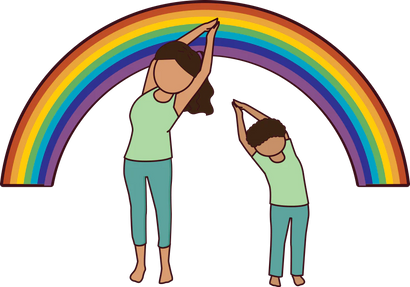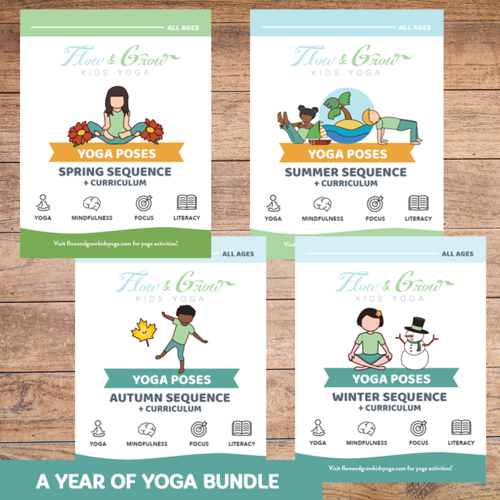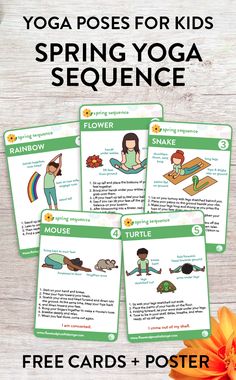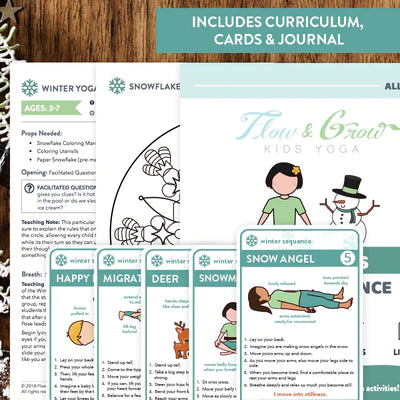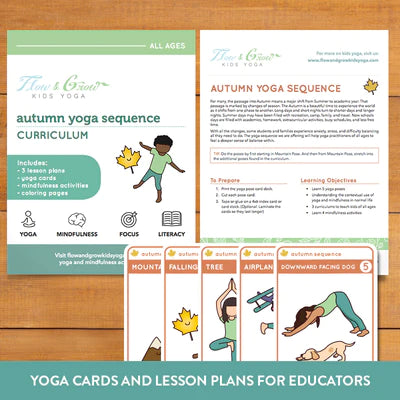Your Cart is Empty
22% off Automatically at checkout when you spend $5 of more!
22% off Automatically at checkout when you spend $5 of more!

The Fifth and Final Yama -- Non-attachment
by Lara Hocheiser June 11, 2021 4 min read
By Kathryn Boland, Flow and Grow Kids Yoga Blog Manager 95-Hour Teacher Training Graduate
"Don't get attached" -- you've probably said it or heard it before. It's certainly easier said than done! We've featured theyamas, or social restraints, in previous blog posts. The last one isaparigraha, non-attachment or non-greed. It's most often useful to flip theyamaconcepts from a negative ("don'tdo this") to a positive ("do practice this") when we're guiding children.
Withaparigraha, we can guide children in gratitude for what they do have. That can lead them away from the tendency to make emotional attachments to things they don't have or might lose. They can instead learn to appreciate what's most important and feel like that's enough.

Little ones sometimes get attached to favorite toys, books, clothes and expected routines. This can be tricky territory because they often find a feeling of safety and comfort in what they can expect. For example, think about security blankets, a favorite teddy bear, or a book they just have to have you read to them each night before bed.
What can be useful is emphasizing the values inherent in these objects or habitual practices -- for instance, what it means to be a good friend from a character in their favorite book or the good feeling of going to bed when you're tired and waking up with the sun. You could note how soft their security blanket is and that a sweater or other soft clothing item of yours is also soft.
Over time, you can help them see that what is comforting goes far beyond that particular item that they cling to. Sharing can help reinforce these values of kindness, friendship, and people over things (and those values can also make sharing easier for them!)
It can also be useful to model an "attitude of gratitude". Some children have trouble transitioning from activity to activity. Joyfully saying something like "thank you story time!", "thank you free play time!" can help shift negative feelings associated with leaving a favorite activity behind to positive ones.

Little ones sometimes get attached to favorite toys, books, clothes and expected routines. This can be tricky territory because they often find a feeling of safety and comfort in what they can expect. For example, think about security blankets, a favorite teddy bear, or a book they just have to have you read to them each night before bed.
What can be useful is emphasizing the values inherent in these objects or habitual practices -- for instance, what it means to be a good friend from a character in their favorite book or the good feeling of going to bed when you're tired and waking up with the sun. You could note how soft their security blanket is and that a sweater or other soft clothing item of yours is also soft.
Over time, you can help them see that what is comforting goes far beyond that particular item that they cling to. Sharing can help reinforce these values of kindness, friendship, and people over things (and those values can also make sharing easier for them!)
It can also be useful to model an "attitude of gratitude". Some children have trouble transitioning from activity to activity. Joyfully saying something like "thank you story time!", "thank you free play time!" can help shift negative feelings associated with leaving a favorite activity behind to positive ones.

Reinforcing the importance of saying "thank you" when children receive a gift is another tool for building gratitude. That gratitude can also help to avoid kids wanting more of what they already have, be it a certain kind of toy or books or kind of outfit. Why want more when you're content with what you already have through a feeling of gratitude?
With older kids, they may get attached to getting certain grades or winning games at the sport they play or getting a certain role in the school play. Just as with younger kids, encourage gratitude. Remind them why they love to do what they love to do. For example, if they're upset about messing up in a certain part of a dance routine, you can say something like "But you had fun, right? You spent time with your friends, right? You love performing, right?."
If they're struggling in a certain subject in school, gently push them to acknowledge the subjects that may come more naturally to them, and what resources they may have to improve the situation -- then guide them in a plan to do better in that subject.
Yet also try to avoid toxic positivity. First acknowledge what they're feeling and that it seems difficult, rather than make them feel as if any particular feeling (or expression thereof) is "bad" or discouraged. Then, bring them back to gratitude for what theydohave.

We all face loss or disappointment in our lives, and cultivating an attitude of gratitude -- versus attaching to what we may lose or fixating on what we don't have -- can be a key tool in our arsenal to weather the grief and sadness that may result.
Attaching to people, places, and things can also cause a lot of unnecessary drama and difficulty in our lives. Learning to appreciate what's most important, that tool of gratitude, can greatly reduce that attachment tendency. The younger we have that tool in our toolbox, the better!
Interested in learning more about Yoga Philosophy for Kids? We have a course for that, within our next 95-hour training. Take it independently or along with the 10 other courses in the full training! Email the Teacher Trainer, Lara Hocheiser, at lara@flowandgrowkidsyoga.com, with any questions -- or book a call with her here. We also have Yoga Philosophylesson plans and cards in our shop!
Leave a comment
Comments will be approved before showing up.
Also in Kids Yoga Blog
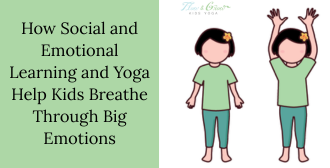
How Social and Emotional Learning and Yoga Help Kids Breathe Through Big Emotions
by Kane SEO April 21, 2025 4 min read
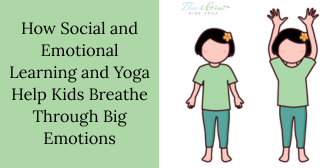
How Social and Emotional Learning and Yoga Help Kids Breathe Through Big Emotions
by Kane SEO April 14, 2025 4 min read
In classrooms and communities around the world, educators and parents alike are placing a growing emphasis onsocial and emotional learning. And for good reason: helping children understand, manage, and express their emotions in healthy ways is just as critical as teaching them to read or do math.

Power of Yoga for Kids: How It Helps Them Grow, Focus, and Thrive
by Kane SEO March 25, 2025 5 min read
In today’s fast-paced world, children are often exposed to stressors from a young age, whether it’s academic pressure, social challenges, or the overwhelming influence of digital devices. This can impact their physical, mental, and emotional well-being.
Ultimate Kids Year of Yoga Bundle
bundlespricey-contentdigital-resourcesearly-childhood-yoga-mindfulnesselementary-yoga-mindfulnesskids-yoga-resourcesmiddle-high-school-yoga-mindfulnessseasonal-yogayoga-cards
Ultimate Kids Year of Yoga Bundle
5 reviews
5.0 / 5.0
(5) 5 total reviews
$45.00
Ultimate Kids Year of Yoga Bundle
5 reviews
5.0 / 5.0
(5) 5 total reviews
$45.00
Kid’s Sun Salutation Yoga Cards
digital-resourcesearly-childhood-yoga-mindfulnesselementary-yoga-mindfulnesskids-yoga-resourcesliteracyunder-15yoga-cards
Kid’s Sun Salutation Yoga Cards
3 reviews
4.33 / 5.0
(3) 3 total reviews
$10.00
Kid’s Sun Salutation Yoga Cards
3 reviews
4.33 / 5.0
(3) 3 total reviews
$10.00
Yamas and Niyamas: Successful Relationships with Self & Others (tweens and teens)
pricey-contentdigital-resourceskids-yoga-resourceslesson-plansmiddle-high-school-yoga-mindfulnessmindfulness
Yamas and Niyamas: Successful Relationships with Self & Others (tweens and teens)
2 reviews
5.0 / 5.0
(2) 2 total reviews
$49.00$55.00
Yamas and Niyamas: Successful Relationships with Self & Others (tweens and teens)
2 reviews
5.0 / 5.0
(2) 2 total reviews
$49.00$55.00
